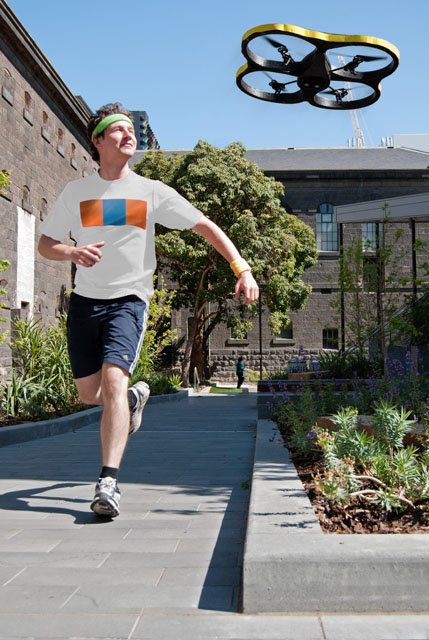Games for Change Festival (Part 2): Gaming for Exercise, Leadership &…World Peace?
EXERCISE and work – two words you don’t usually associate with games. Or fun. But as Amy Lau and Grace Yew find out, all things are possible in the virtual world. Plus, we hear about the passionate developers who truly believe games can change the world.
Exertion Games Lab and Good Gym
Experts believe games have revolutionised the fitness industry. There are programmes that blend exercise with game elements – and the combination is a promising one.
Florian (Floyd) Mueller, from the Royal Melbourne Institute of Technology’s Exertion Games Lab, believes the exercise-game combo are “where games should be in a decade”.
“Technology creates new opportunities for engagement and how we can inject play into physical activity,” he says.
Exertion Games Lab takes after the Kinect and Wii, producing games that fall in the “exertion” genre – that is games to “to get people excited about moving their bodies”.
Their “physical”inventions place the human body at the centre of a digital experience, such as holographic games on public transport, interactive bicycle helmets that light up when used (Luma Helmet), and a flying robot that serves as a jogging companion (Joggobot).
The holographic games are particularly interesting, says Dr Mueller, as they incorporate the surrounding environment to facilitate relationships between players and non-players.
Similarly, Ivo Gormley’s Good Gymhas been hailed as a force for social change in the United Kingdom. The mission-based game draws inspiration from location- and social networking-based programmes like Foursquare and Run Zombies Run.
Good Gym remarkably creates social relationships between runners and elderly “coaches” and combats social issues such as isolation and obesity at the same time.
Mr Gormley says the game’s charm is that it motivates people to get out of their comfort zones and do some running. It engenders a healthy, productive lifestyle: something that is missing from the lives of many students and working people.
Due to the effectiveness and popularity of Good Gym, it’s possible the fitness industry will see a rise in social fitness games, accompanied by a much healthier society.
Deloitte Leadership Academy
When this year’s graduates enter the workforce, they can expect employers to trot out game-inspired initiation processes.
At the “How Games Can Change Enterprises” panel session, prominent members of the business community provided insights into games within commercial organisations.
Pete Williams, a Deloitte Centre for the Edge innovator and leader, opened the discussion with an introduction to Deloitte’s gaming workshop, where staff design and test board games made from everyday items.
Mr Williams says Deloitte also has a leader board – Gaming Enterprise Learning: Deloitte Leadership Academy – to motivate staff and recognise their achievements.
He says Centre for the Edge views game communities and incentive-based leader board systems as “the most effective examples” of games in the workplace.
“It works for Angry Birds,” he laughs.
Still, it’s not all fun and games at the office. PricewaterhouseCoopers Director (Digital), Anthony Mittelmark, says workplace processes are not games, but concedes the processes being presented as such can be good for the organisation’s productivity.
“The best games are ones you don’t realise you’re playing, where you become so engaged you don’t even notice what’s happening.”
Looking into the future: Video game romantics
Keita Takahashi, the Japanese director and designer behind Katamari Damacy, Noby Noby Boy, and Glitch, described game creators and players as “video game romantics”. Games, he says, are an art form that can empower humanity and provide a new perspective on the world.
“With games we can mediate the people busy fighting. We can help people who are living in poverty, suffering from disease, even starving.
“Some people say I am a dreamer, but this doesn’t just have to be about video games — it can be books, art, music. We should not make light of the power of imagination.”
Katamari, for instance, is imbued with his trademark light humour, and focuses on allowing players to easily, fully interact with in-game universes.
Its aim, explains Mr Takahashi, is to provide a unique game experience and empower players to achieve great things.
“Games change your perception of how things are or could be,” he muses.
Looking into the future, we have no idea what kind of games will survive. But if games can change players’ way of thinking and even life, that would be amazing.”
Mr Takahashi’s predictions are not far off. Games have improved education, health, and social productivity, for people of all backgrounds and by all accounts, they’ll continue to do so for years to come.
The Games for Change experts believe life will be “gamified” in the very near future as more industries adopt game mechanics to engage communities.
To the many university graduates facing the extremely daunting task of transitioning from academic life to society, Games for Change has this to say:
If you are going out into the world, you had better be prepared to play.
